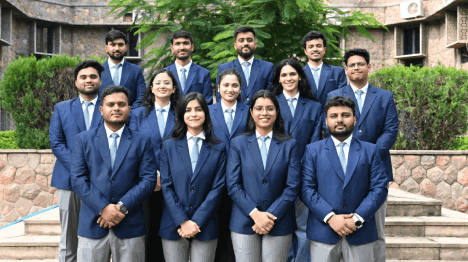- About Us
-
Academics
Schools
Programs
General Information
-
Faculty
The faculty members and researchers working at IIHMR University come from varied backgrounds including, but not limited to medicine, public health, management, economics, statistics, demography, human geography, social and behavioral sciences, rural development and pharmaceuticals.
-
Admissions
- Research
Publications & Journal
- Executive Education
Executive Programmes
- Online Certification Courses
ONLINE CERTIFICATION Courses
- Training
- Placements
- Contact
- Pradanya
- Blog
- Fee Payment
- NAAC
- IQAC
- NIRF
-
About Us
- About IIHMR University
- Board of Management
- Academic Council
- Board of Studies
- Research Board
- Institutional Review Board
- Finance & Audit Committee
- Departmental Research Committee
- Chairperson's Message
- President's Message
- IIHMR University Act
- Infrastructure
- Collaboration
- Ranking
- Board of Studies (School of Digital Health)
- Awards & Accolades
-
Academics
- Institute of Health Management Research
- School of Pharmaceutical Management
- ML Mehta School of Development Studies
- School of Digital Health
- SD Gupta School of Public Health
- MBA (Hospital and Health Management)
- MBA (Pharmaceutical Management)
- MBA (Development Management)
- MBA (Healthcare Analytics)
- Master of Public Health
- Student Manual – Cohort 9 (2021-2023)
- Master of Public Health (Offered by Johns Hopkins Bloomberg School of Public Health, USA in cooperation with IIHMR University, Jaipur, India)
- Ph. D.
- MBA CSR & ESG Management (Executive)
- MBA Sustainable Business Management (Executive)
- Common Information for all the Programs
- Academic Calendar
- Student Handbook 2020-21
- Committees
- Policies
- Annual Exam Calendar
- Library
- Faculty
- Officers of University
- Dean of Institute of Health Management Research
- Dean of School of Pharmaceutical Management
- Dean of School of Development Studies
- Dean of SD Gupta School of Public Health
- Dean of School of Digital Health
- School of Digital Health
- Faculty List A to Z
- Faculty List Designation Wise
- Faculty List School Wise
- Admissions
- Research
- Executive Education
- Training
- Placements
- Alumni
- Events
- Job Openings
- Contact
- Research
End-line Evaluation of Youth Education on Sexuality (YES) Project in Agra District of UP
Agency : FPA India, Mumbai
A project on Youth Education on Sexuality (YES) was implemented by the Family Planning Association of India (FPA India), funded by the Community Fund, National Lottery Charities Board (NLCB) through International Planned Parent Federation ' South Asia Regional Office (IPPF-SARO). The project was implemented in 316 villages and five towns of two sub-divisions, Kiroli and Kheragarh of Agra district in Uttar Pradesh, from January 2001 to December 2005. The five-year project offered a unique opportunity to young people to lead a happy, healthy and satisfying sexual life free of exploitation, fear, guilt, misconceptions and diseases. The primary beneficiaries of the project were young people (10-24 years), whereas secondary beneficiaries included parents, teachers and community leaders.
The objectives of the YES were:
- To enlist support from the community to enable the youth to make voluntary and responsible reproductive health choices
- To increase the accessibility of services and correct information to the youth to improve their sexual and reproductive health status and protect them from avoidable reproductive health risks.
- To enable the youth to lead a sexual life free from exploitation, fear, shame, guilt and misconceptions/ false beliefs about sexuality.
- To effect a reduction in adolescent pregnancy by 10 percentage points and an increase in the girl's age at marriage by 3.2 years by the end of 2005.
The awareness of sexual and reproductive rights as well as of seeking services as and when required was reasonably found among 8200 adolescents including females in the annual reports. The end-line evaluation report reflected that males (72%) and females (66%) were sensitive towards their sexual health needs. About 4400 expecting mothers received ANC services and approximately 2500 mothers received PNC services during project implementation. More than 12500 youths received information through project efforts on implications of early marriage and early child bearing. Mean age at marriage was found to be 20 years for the boys and 18 years for the girls in the intervention area, against 19 for the boys and 17 for the girls in the control area.
Increase in contraceptive practices among 7300 couples reflected the advocacy in women regarding unwanted pregnancies and untimely pregnancies, and improvement in the quality of their lives. A majority of youth (71%) was aware of female sterilization regarding permanent methods. Similarly, within the intervention area a majority of 15-24 years youths (85%) had awareness of oral pills and condoms as a spacing method compared to the youths of 10-14 years (60% - 69%).
The project was successfully implemented with the three key strategies for achieving the overall goal, which was to enable young population to develop improved sexual and reproductive health (SRH) status and to exercise their reproductive rights and responsibilities. These strategies may be replicated in other areas for up-scaling the SRH programme for better results with a wider coverage.



